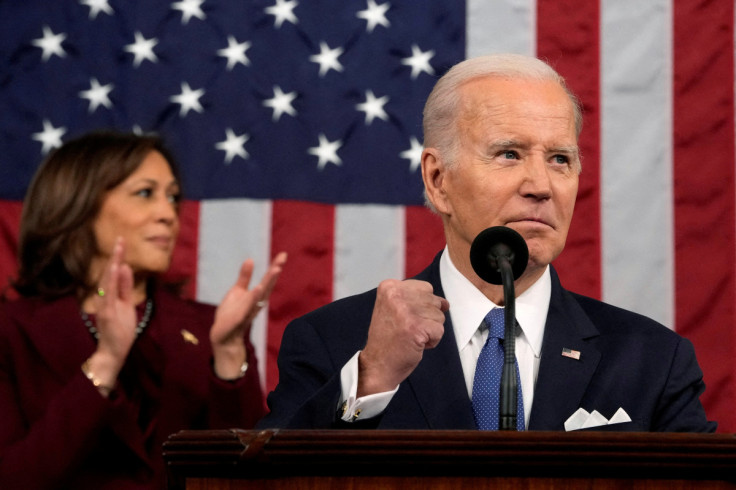
NEW YORK CITY - President Biden is set to deliver his third State of the Union address on Thursday, in what could possibly be his best shot to convey to Americans his administration's success and plans before the elections in November.
The address will come after a tumultuous year not only for the Biden administration, but for Congress as well. From the economy, to impeachment trials and inability to pass key legislation, Capitol Hill has seen itself plagued by controversy and uncertainty.
With a tense environment ahead of the November election, and a Biden-Trump rematch on the horizon, the incumbent will likely use this speech as an opportunity to draw key distinctions between his party and the GOP, as well as try to quiet concerns about his age.
Here's are some keys you should know about the annual event.
What time will the State of the Union address start?
The speech is set to begin at 9 p.m. EST, and it usually runs for about an hour.
Who will be attending the address?
The State of the Union is the time of the year in which the three branches of government— executive, legislative and judicial— get together under one roof. In other words, the Vice President, Supreme Court justices, Biden's cabinet, alongside members of the House and the Senate are expected to attend.
Will the GOP respond to the address?
It is customary for the opposing party to issue a response to the President's remarks. This year, the Republican response will be delivered by Sen. Katie Britt of Alabama, the first woman elected to represent the state in the Senate. Her speech is set to begin right after the president ends his remarks, likely some time after 10 p.m. EST.

What about immigration?
The elephant in the room, immigration, will likely continue to be an issue of fervor for both parties. With around 57% of Americans saying dealing with immigration should be a top policy goal for the president and Congress this year, this issue will take center stage during the address, at the very least symbolically.
Republican lawmakers have invited guests who place heavy focus on the nation's embattled immigration system to be their guests at the State of the Union.
Rep. Elise Stefanik, a Republican from New York, is bringing Brandon Budlong, a Border Patrol agent and president of local 2724 of the National Border Patrol Council, the union that represents agents in the Buffalo sector of the northern walk. Stefanik voted for the Republican-led Secure the Border Act and voted to impeach Homeland Security Secretary Alejandro Mayorkas, according to the Los Angeles Times.
On the other hand, Rep. Adam B. Schiff, a Democrat from California, announced he would bring United Farm Workers President Teresa Romero, who will draw his support for a pathway to citizenship for farmworkers. On Tuesday, Schiff won his primary bid to vie for the U.S. Senate in November, with support from labor unions like the UFW.
Other guests will include an immigrant rights activist from Chicago, Deferred Action for Childhood Arrivals (DACA) program recipients and the wife of a man killed by a neighbor in Texas who said Latinos weren't welcome in his community.
Verbally and explicitly however, Biden will likely not devote a great deal of time to discussing immigration.
"Do you want to remind people that 'I've been in office for three years and we've had more people come across the border than [ever]'? It's somewhat of a failure," said Alison Howard, a political science professor at Dominican University of California who researches State of the Union speeches.
Nevertheless, a White House official, who discussed the address with the LA Times in anonymity, said the president planned to say that the Republican-controlled House should pass the bipartisan security bill and address the need for more resources and policy reform.
What other topics will the President likely talk about?
Biden is set to also highlight key issues that have been on Americans' minds this past year.
"Bidenomics," the president's economic policy, will likely be highlighted in his remarks. Lael Brainard, who heads the president's National Economic Council, told The New York Times that the president would stress recent wage gains, low unemployment and new factory constructions, as well as draw sharp contrasts with his predecessor's economic issues, including tax policy and reducing consumer costs.
Furthermore, the President will be under close watch from pro-choice activists. As a practicing Catholic, Biden is known to be uncomfortable using the word "abortion" frequently, and instead choosing phrases like "reproductive health" and "the right to choose." But as the overturning of Roe v. Wade has become a salient issue among his electorate, his stance— including his language— will prove to be decisive.
Of course, the war in Gaza will likely be mentioned, given the recent outrage protesters have shown to Biden in his recent public appearances. Several House members are bringing Palestinian Americans who have lost family members in Gaza to be their guests at the event.
© 2025 Latin Times. All rights reserved. Do not reproduce without permission.




